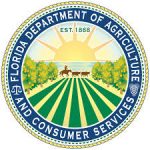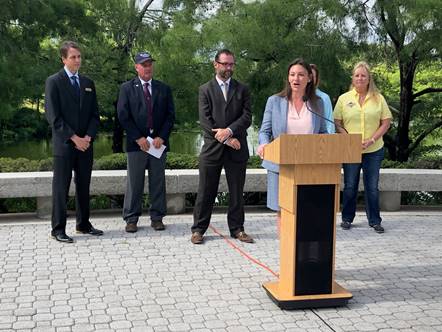
Commissioner Nicole “Nikki” Fried today announced her appointment of Christopher Pettit as Director of Agricultural Water Policy for the Florida Department of Agriculture and Consumer Services. Speaking outside the South Florida Water Management District, Fried highlighted Pettit’s background in water resources management in Florida and beyond. A livestream of the press conference may be viewed here.
“Addressing our state’s water issues was one of my top priorities when running for this office, and today’s appointment is an important step towards achieving that goal,” said Commissioner Fried. “Cleaning up our water – and keeping it clean for generations to come – requires bringing everyone to the table to find real, comprehensive solutions to our water concerns. Chris’ deep experience with the management and conservation of Florida’s water resources make him a natural choice to lead our efforts on water policy. Our shared approach of finding common ground with our agricultural and environmental communities is part of my ongoing commitment to our state’s water future.”
“Thank you to Commissioner Fried for the opportunity to lead this office of paramount importance to the water and environmental resources of our great state,” said Christopher Pettit. “I enthusiastically share the Commissioner’s vision of finding common ground with agricultural and environmental communities in pursuit of healthy ecosystems and watersheds, as well as her respect for the role and efforts of the agricultural community and other stakeholders in achieving that vision.”
Pettit had previously served in the Office of Counsel for both the South Florida Water Management District and the Southwest Florida Water Management District, and most recently served as the Policy and Legislation Manager for Palm Beach County Utilities, coordinating with state and federal regulatory agencies on water and environmental policy. Pettit has also served as a Law and Policy Fellow at the University of Florida Water Institute, a Law and Policy Fellow at the Mote Marine Laboratories Marine Policy Institute, and co-authored a U.S. Agency for International Development toolkit for climate resilient water utility operations being used internationally.
Fried and Pettit were joined at the press conference by Drew Bartlett, Executive Director of the South Florida Water Management District; Dr. Paul Gray, Okeechobee Science Coordinator for Audubon Florida; Leslie Bertolotti, Water Resources Planner for The Nature Conservancy; and Marie Bedner, Operations Manager for Bedner’s Farm and Bedner’s Farm Fresh Market.

“I’m really excited about Chris’ appointment, as he’s a very collaborative person to work with,” said Dr. Paul Gray of Audubon. “If you think about our state, most of it is owned by private landowners, and most of it is agriculture. If we’re going to fix our watershed problems, we’re going to have to work with agriculture — and I hope we’re really, genuinely, entering a new era where we work with these landowners and help them to be a part of our water solutions.”
“The Bedner family has been farming in Palm Beach County for over 50 years, and we’ve been implementing best management practices since before the term existed,” said Marie Bedner of Bedner’s Farm. “We believe in being very good stewards of the land, and working to minimize the impact on the natural resources in South Florida. Farmers were some of the first environmentalists and we take that very seriously — we have to maintain good soil and good water so we can produce a healthy crop and take it to production.”
Improving Best Practices: Fried announced that the Office will be reviewing agricultural best management practices (BMPs) to ensure the integration of the latest technologies and practices, undertaking technological and programmatic improvements aimed at increasing enrollment in BMPs, and undertaking additional on-farm BMP verifications to coordinate with the Florida Department of Environmental Protection in its role as regulatory agency.
Increasing Cost Sharing: She also announced she will seek additional cost sharing funding from the legislature to help farmers acquire the latest water-efficient, pollution-reducing technologies — Fried had sought $25 million in the 2019-20 budget, but only received $4 million, a decrease from $5 million in 2018-19. These cost sharing funds are dedicated to projects aimed at pollution reduction, water conservation, and water retention.
“Our farmers can be some of the best stewards of our lands, and our agricultural areas are some of our best water recharge opportunities. That’s why I’m committed to helping our farmers use the latest technologies to reduce nutrient runoff and conserve water, by helping them afford and implement those technologies the right way,” said Commissioner Fried. “I look forward to collaborating with Governor DeSantis’ blue green algae and red tide task forces, and doing everything in our authority to protect the water on which our economy, our environment, and our lives depend.”
The Office of Agricultural Water Policy works with agricultural producers, industry groups, state agencies, universities, and water management districts to develop and implement agricultural best management practices that address both water quality and water conservation. These best practices are practical, cost-effective actions to conserve water and reduce pesticides, fertilizers, and pollutants entering our water systems.
